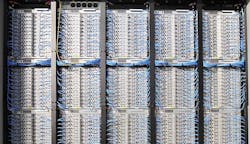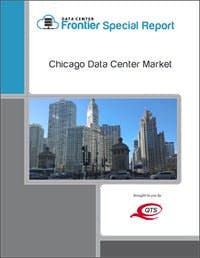Microsoft leased as much as 125 megawatts of third-party data center space in 2016, accounting for the top six deals in the wholesale data center market during 2016, according to a new report. The massive leasing by Microsoft was the highlight in a blockbuster year for wholesale providers, including the publicly-held data center REITs (real estate investment trusts).
“Hyperscale cloud leasing led by Microsoft and Oracle in Multi-Tenant Data Centers (MTDC) drove a 25 percent increase in leasing activity from 2015; a historic high,” wrote Jim Kerrigan of North American Data Centers, whose latest report tracks deals and space in the wholesale space. “Large cloud providers shifting from speculative leasing to pre-leasing during the past 15 months have been a welcome occurrence to the overall MTDC market.”
The enormous deal volume has left industry watchers wondering whether this level of activity is sustainable. Kerrigan believes that the blockbuster leasing will continue.
“I think there’s a lot of pent-up demand, and not a lot of supply,” said Kerrigan. “There’s a lot of deals that didn’t get done late last year, and I don’t think Virginia and Chicago have enough supply coming online.”
Keeping Up With AWS
As we’ve noted, the cloud computing arms race is accelerating, and the battle will be waged with data centers. The robust activity in 2016 demonstrates that the growth of cloud computing is providing a huge boost for data center developers.
The pace setter in the cloud market is Amazon Web Services, which continues a massive expansion of its data center infrastructure to keep pace with its growth. Its chief rivals, Microsoft and Google, are actively expanding as well. While Google is focused on building new facilities, Microsoft has looked to lease wholesale space from third-party providers.
The company’s two largest deals, according to North American Data Centers, boosted the fortunes of private developers. Microsoft has leased 35 megawatts from CloudHQ in Manassas, Virginia and 30 megawatts from EdgeConneX in Chicago, according to the report. CloudHQ is a new company led by Hossein Fateh, the former CEO of DuPont Fabros Technology. EdgeConneX has rapidly built a network of smaller data centers to support edge computing, but is now leveraging its expertise in construction to win hyperscale deals.
Microsoft has also signed large deals with data center REIT CyrusOne in Northern Virginia (22MW), Phoenix (13MW) and San Antonio (9MW), as well as a large (16MW) pre-lease with DuPont Fabros in the Santa Clara market.
As it seeks to expand its infrastructure to support its shift to the a cloud-driven business model, Microsoft is pursuing a hybrid strategy we first noted in 2013, in which it builds state-of-the-art data centers in areas where land and power are cheap, and leases third-party wholesale space in key markets where it is expensive to build and operate large server farms.
Oracle Focuses on Virginia, Chicago
In any other year, the big story would be the huge leasing by Oracle, which has massively boosted its investment in cloud capacity. Oracle CEO Larry Ellison was once known for his disdain for cloudy jargon. But in recent years Oracle has begun shifting to a cloud delivery model.
During 2016 Oracle signed seven deals totaling about 30 megawatts of wholesale space, according to North American Data Centers, including four deals that added 20 MW of capacity in Northern Virginia, and three significant leases totaling 10 MW in Chicago. The company spread the wealth, doing deals with CyrusOne, QTS, Digital Realty and RagingWire, the report said.
Today Oracle announced three new cloud regions in Virginia, the United Kingdom and Turkey. Oracle says it has doubled the regional presence of its cloud platform in the last 24 months, with 29 regions available globally and more scheduled to come online in APAC, North America, and the Middle East through mid-2018.
“Oracle is committed to building the most differentiated Cloud Platform that delivers on the requirements of a wide array of customer workloads,” said Deepak Patil, vice president of development, Oracle Cloud Platform. “This regional expansion underscores our commitment to making the engineering and capital investments required to continue to be a global large scale cloud platform leader.”
Is There Enough Supply?
Microsoft and Oracle aren’t the only large players focused on the hot Northern Virginia and Chicago markets, where Kerrigan sees robust demand and not a lot of finsihed space.
“I think Northern Virginia and Chicago don’t have enough supply coming online,” said Kerrigan.
Data Center Frontier Special Report: The Chicago Data Center Market
The Suburban Chicago data center market is seeing an influx of new providers and supply, which positions the region for growth in the accelerating arms race to deploy IT capacity for cloud computing. Chicago is now one of the most active markets for new data center development, with more than 200 megawatts (MWs) of capacity either under construction or in the planning phases.
Meanwhile, demand in the highly competitive Northern Virginia market continues, with Digital Realty, Equinix, RagingWire, Sabey Data Centers, Infomart Data Centers, DuPont Fabros and Iron Mountain are all building new facilities in the Ashburn to support tenant demand.
Kerrigan noted several other trends to watch in the wholesale market in 2017:
- There will be an increase in supply for less resilient data centers and N solutions. In addition, there will be an influx of properties that have densities ranging from 100/kW to over 300/kW. Currently available are N+1 and 2N solutions with higher densities.
- There were several occasions in 2016 where major tenants have terminated leases early, providing some very attractive plug and play space. It remains to be seen whether density will be sufficient or excessive in markets such as Ashburn and Chicago in 2017.
- As a result of large increases in data traffic, more subsea cable was laid during 2016 than the last five years combined.
- New projects in Quebec and Toronto will finally create multi-tenant data center assets in Canada. The decline in the Canadian Dollar has created parity for construction pricing to match some U.S. markets. However, rental rates remain significantly higher.







